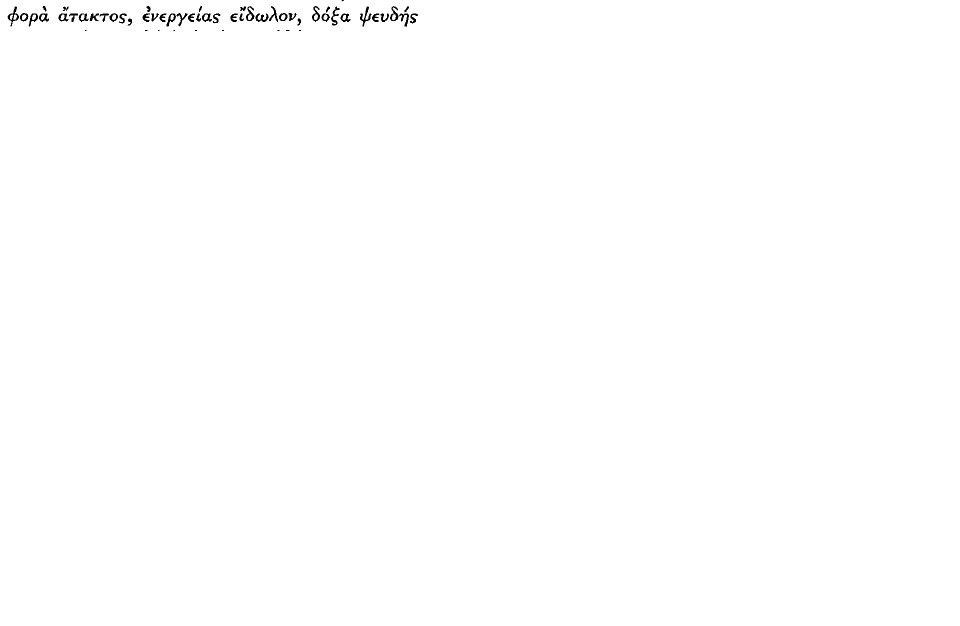Research Article
Observations on the Style of Varro1
-
- Published online by Cambridge University Press:
- 11 February 2009, pp. 1-28
-
- Article
- Export citation
The Riddles in Virgil's Third Eclogue
-
- Published online by Cambridge University Press:
- 11 February 2009, pp. 29-32
-
- Article
- Export citation
An Early Inscription at Argos1
-
- Published online by Cambridge University Press:
- 11 February 2009, pp. 33-36
-
- Article
- Export citation
Theocritus I.95 f.
-
- Published online by Cambridge University Press:
- 11 February 2009, pp. 37-40
-
- Article
- Export citation
Sex. Clodius—Sex. Cloelius
-
- Published online by Cambridge University Press:
- 11 February 2009, pp. 41-42
-
- Article
- Export citation
Auctoritas, Dignitas, Otium
-
- Published online by Cambridge University Press:
- 11 February 2009, pp. 43-50
-
- Article
- Export citation
The Manuscript a of Sophocles and its Relation to the Moschopulean Recension
-
- Published online by Cambridge University Press:
- 11 February 2009, pp. 51-64
-
- Article
- Export citation
Clausulae in the Rhetorica ad Herennium as Evidence of its Date
-
- Published online by Cambridge University Press:
- 11 February 2009, pp. 65-78
-
- Article
- Export citation
Aeschylea
-
- Published online by Cambridge University Press:
- 11 February 2009, pp. 79-83
-
- Article
- Export citation
Eleatic Questions
-
- Published online by Cambridge University Press:
- 11 February 2009, pp. 84-102
-
- Article
- Export citation
Menander's Hypobolimaios
-
- Published online by Cambridge University Press:
- 11 February 2009, pp. 103-109
-
- Article
- Export citation
Two Notes
-
- Published online by Cambridge University Press:
- 11 February 2009, pp. 110-112
-
- Article
- Export citation
The Distribution of Parts in Menander's Dyskolos1
-
- Published online by Cambridge University Press:
- 11 February 2009, pp. 113-117
-
- Article
- Export citation
Palladas on Tyche
-
- Published online by Cambridge University Press:
- 11 February 2009, pp. 118-128
-
- Article
- Export citation
Euripides, Electra 1093–5, a nd Some Uses of δικάζειν
-
- Published online by Cambridge University Press:
- 11 February 2009, pp. 129-134
-
- Article
- Export citation
Dicta Scipionis of 131 B.C. 1
-
- Published online by Cambridge University Press:
- 11 February 2009, pp. 135-139
-
- Article
- Export citation
Prodelision in Greek Drama
-
- Published online by Cambridge University Press:
- 11 February 2009, pp. 140-144
-
- Article
- Export citation
Front matter
CAQ volume 10 issue 1-2 Cover and Front matter
-
- Published online by Cambridge University Press:
- 11 February 2009, pp. f1-f6
-
- Article
-
- You have access
- Export citation
Back matter
CAQ volume 10 issue 1-2 Cover and Back matter
-
- Published online by Cambridge University Press:
- 11 February 2009, pp. b1-b3
-
- Article
-
- You have access
- Export citation


 The inscription is dated to the seventh century B.C. by epigraphists. The stone itself was seen in 1729 by Fourmont and rediscovered in 1928 by Vollgraff; it was in the wall of a Venetian tower on the Larissa or acropolis of Argos. No one knows whence the Venetians had taken it. Therefore Vollgraff's suggestion that it had originally been set up in
The inscription is dated to the seventh century B.C. by epigraphists. The stone itself was seen in 1729 by Fourmont and rediscovered in 1928 by Vollgraff; it was in the wall of a Venetian tower on the Larissa or acropolis of Argos. No one knows whence the Venetians had taken it. Therefore Vollgraff's suggestion that it had originally been set up in  ‘sit on eggs’ after Hesychius or
‘sit on eggs’ after Hesychius or  ‘cry
‘cry  ’, ‘lament’ after Nauck? In his recent supplement to the Loeb
’, ‘lament’ after Nauck? In his recent supplement to the Loeb 
 ), would certainly have encouraged the poet to write these later passages. But there is a dearth of objective argument on this matter which I want, if possible, to supply.
), would certainly have encouraged the poet to write these later passages. But there is a dearth of objective argument on this matter which I want, if possible, to supply. (Stob. 1. 41. 1), in an anonymous couplet,1 which looks as if it came from the last years of Paganism:
(Stob. 1. 41. 1), in an anonymous couplet,1 which looks as if it came from the last years of Paganism: means ‘sitting in judgement’, ‘punishing’, or the like, (2) that the
means ‘sitting in judgement’, ‘punishing’, or the like, (2) that the  which is its subject as well as that of
which is its subject as well as that of  is the
is the  in a series of two: the subsequent slaying punishes or sits in judgement on the previous; thus the slaying of Cly taemnestra herself will sit in judgement upon that of Agamemnon, just as that had sat in judgement upon the
in a series of two: the subsequent slaying punishes or sits in judgement on the previous; thus the slaying of Cly taemnestra herself will sit in judgement upon that of Agamemnon, just as that had sat in judgement upon the  of Iphigenia. Then opinions differ as to whether
of Iphigenia. Then opinions differ as to whether  is to be taken as the object of both verbs, or of one but not the other.
is to be taken as the object of both verbs, or of one but not the other. takes place when a word ending in a long vowel or diphthong is immediately followed by another word beginning with a short vowel. Though it is very occasionally found in inscriptions and in the manuscripts of certain prose authors, particularly those of Plato—almost uniquely
takes place when a word ending in a long vowel or diphthong is immediately followed by another word beginning with a short vowel. Though it is very occasionally found in inscriptions and in the manuscripts of certain prose authors, particularly those of Plato—almost uniquely  and its cases—it is to be considered as essentially a verse phenomenon, affecting as it does the metre of the line in which it occurs. Prodelision was unknown to Homer and Hesiod, is rare in lyric, and seems only to come into real use with the dramatists of the fifth century. An examination of the practice of the three tragedians and of Aristophanes is not without interest in itself and may occasionally throw some light on points of textual criticism.
and its cases—it is to be considered as essentially a verse phenomenon, affecting as it does the metre of the line in which it occurs. Prodelision was unknown to Homer and Hesiod, is rare in lyric, and seems only to come into real use with the dramatists of the fifth century. An examination of the practice of the three tragedians and of Aristophanes is not without interest in itself and may occasionally throw some light on points of textual criticism.